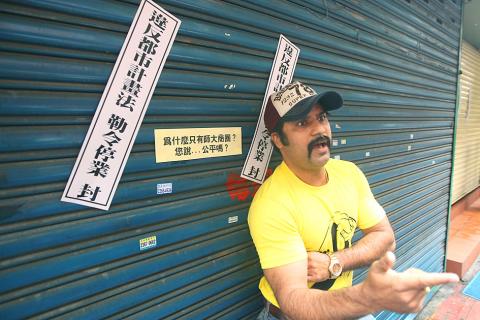Restaurants and eateries on “exotic gourmet street” at Shida Night Market in Taipei yesterday shut their doors during the lunch hour to protest the Taipei City Government’s recent crackdown on illegal businesses in the area.
After hanging protest signs that read: “Why target only Shida commercial area? Is it fair?” on their doors, about 30 restaurants on Pucheng Street and Longquan Street delayed opening until late yesterday afternoon.
The move, restaurant owners said, was aimed at raising public awareness of local business’ contributions to the area.

Photo: CNA
“We are hoping that by closing our doors during the lunch hour, local residents and students will understand how inconvenient it is without places for them to go for lunch,” an employee at an Indian restaurant said.
Vendors’ self-help association spokesman Ker Yu-you (柯裕佑) said local business owners would continue their efforts in an attempt to ensure the survival of their businesses and he urged the city government not to make its top tourist attraction disappear.
The local residents’ self-help association, on the other hand, insisted that the city government should not allow illegal businesses to stay in the area, noting the air and noise pollution, as well as the public hazard caused by some shops and restaurants.
“Local residents are the real victims here. Illegal businesses should close their doors forever and give us back a clean and safe living environment,” association director Liu Cheng-wei (劉振偉) said.
Taipei City Government spokesman Chang Chi-chiang (張其強) said the city government’s goal of maintaining a safe and quiet environment for residents remained the same.
“It’s not our goal to eliminate the night market, we only target businesses that have caused serious public safety concerns and that have violated the regulations,” he said.
Disputes over the night market began after Taipei Mayor Hau Lung-bin (郝龍斌) announced in November last year that expansion of the market would not be allowed following a growing number of complaints from residents about the trash and noise vendors and customers caused.
In addition to noise and air pollution, some local vendors have also violated regulations as their locations are classified as a residential zone. According to land-use regulations, roads less than 6m wide in residential zones cannot be used for commercial purposes.
Taipei City’s Construction Regulation Office said it has issued notices to 91 shops in the area that have violated regulations. In addition to Shida, a coffee shop in Yongkang commercial area (永康商圈), another popular destination filled with small shops and restaurants, also received notice from the city government as it is located in an alley less than 6m wide.
Chang dismissed concerns that the city government is targeting specific commercial districts, saying the coffee shop in Yongkang is an individual case, because local residents had filed complaints against the shop.

ENDEAVOR MANTA: The ship is programmed to automatically return to its designated home port and would self-destruct if seized by another party The Endeavor Manta, Taiwan’s first military-specification uncrewed surface vehicle (USV) tailor-made to operate in the Taiwan Strait in a bid to bolster the nation’s asymmetric combat capabilities made its first appearance at Kaohsiung’s Singda Harbor yesterday. Taking inspiration from Ukraine’s navy, which is using USVs to force Russia’s Black Sea fleet to take shelter within its own ports, CSBC Taiwan (台灣國際造船) established a research and development unit on USVs last year, CSBC chairman Huang Cheng-hung (黃正弘) said. With the exception of the satellite guidance system and the outboard motors — which were purchased from foreign companies that were not affiliated with Chinese-funded

PERMIT REVOKED: The influencer at a news conference said the National Immigration Agency was infringing on human rights and persecuting Chinese spouses Chinese influencer “Yaya in Taiwan” (亞亞在台灣) yesterday evening voluntarily left Taiwan, despite saying yesterday morning that she had “no intention” of leaving after her residence permit was revoked over her comments on Taiwan being “unified” with China by military force. The Ministry of the Interior yesterday had said that it could forcibly deport the influencer at midnight, but was considering taking a more flexible approach and beginning procedures this morning. The influencer, whose given name is Liu Zhenya (劉振亞), departed on a 8:45pm flight from Taipei International Airport (Songshan airport) to Fuzhou, China. Liu held a news conference at the airport at 7pm,

Taiwan was ranked the fourth-safest country in the world with a score of 82.9, trailing only Andorra, the United Arab Emirates and Qatar in Numbeo’s Safety Index by Country report. Taiwan’s score improved by 0.1 points compared with last year’s mid-year report, which had Taiwan fourth with a score of 82.8. However, both scores were lower than in last year’s first review, when Taiwan scored 83.3, and are a long way from when Taiwan was named the second-safest country in the world in 2021, scoring 84.8. Taiwan ranked higher than Singapore in ninth with a score of 77.4 and Japan in 10th with

GRIDLOCK: The National Fire Agency’s Special Search and Rescue team is on standby to travel to the countries to help out with the rescue effort A powerful earthquake rocked Myanmar and neighboring Thailand yesterday, killing at least three people in Bangkok and burying dozens when a high-rise building under construction collapsed. Footage shared on social media from Myanmar’s second-largest city showed widespread destruction, raising fears that many were trapped under the rubble or killed. The magnitude 7.7 earthquake, with an epicenter near Mandalay in Myanmar, struck at midday and was followed by a strong magnitude 6.4 aftershock. The extent of death, injury and destruction — especially in Myanmar, which is embroiled in a civil war and where information is tightly controlled at the best of times —